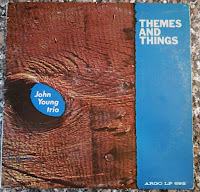John Young Trio - Themes and Things
Released 1962
Recording and Session Information
John Young Trio>
John Young, piano; William Yancey, bass; Phillip Thomas, drums>
Ter Mar Studios, Chicago, June 6, 7 1961
10948 Fever>
10949 Playboy theme>
10950 Weaver of dreams>
10951 Mr. Lucky>
10952 Young blues>
10953 Slow blues (unissued)>
10954 Theme from "Peyton Place">
10964 Theme from Spartacus>
10965 One-eyed Jack>
10966 Take five>
10967 Portrait of my love>
10968 My romance>
10969 When Sunny gets blue>
10970 This could be the start of something big (unissued)>
>
Track Listing
| Portrait Of My Love | Ornadel, West | June 6, 7 1961 |
| When Sunny Gets Blue | Fisher, Segal | June 6, 7 1961 |
| Take Five | Desmond | June 6, 7 1961 |
| Peyton Place | Yuffy, Halyate, Bass | June 6, 7 1961 |
| Fever | Glover | June 6, 7 1961 |
| Mr. Lucky | Henry Mancini | June 6, 7 1961 |
| Spartacus (Love Theme) | North | June 6, 7 1961 |
| Weaver Of Dreams | Young, Elliott | June 6, 7 1961 |
| My Romance | Rodgers, Hart | June 6, 7 1961 |
| Playboy Theme | Cy Coleman | June 6, 7 1961 |
| One Eyed Jacks (Love Theme) | Friedhofer | June 6, 7 1961 |
| M J R Blues | Thompson, Wilson, Evans | June 6, 7 1961 |
Liner Notes
THEMES AND THINGS is the music John Young is most apt to be called upon to play at any given moment during his usually extended stays at one or another of Chicago•s smart intimate clubs. The themes included herein, I'm sure are quite familiar to you. Their interpretation, however, is more different than ordinary, for John Young is not an ordinary performer of music. He is, rather, an astute student of awareness, whose talent lies in his ability to garner from even the most uninteresting compositions the most important elements. This is the same talent that made greats of Billie Holiday, Fats Waller, Lester Young. etc, John Young has the talent to enhance ordinary or hackneyed themes, to seek out their inner beauty, and has the taste to embroider them properly so that new life may spring from their tired tones. This is not to say that all of the this album lies in this category, although undeniably some of it does! Most the lovely "love theme" from Spartacus stands on its own merit, as does Peyton Place and One Eyed Jack."Things" include several standard ballads, My Romance, Portrait Of My Love, When Sunny Gets Blae, and the unusual Weaver Of Dreams. The original blues, MJR, was co-composed by three fine Chicago musicians, all of whom appear regularly on Argo; Marshall Thompson, drums; Jack Wilson, piano; and Richard Evans, bass. And its theme is not too unlike the famous Bags Groove.
A few of the musical highlites for you to pay particular attention to include the Tatm-like intro and beautiful milking of the sweet melody of When Sunny Gets Blue: the parody onsumptuous movie grandioseness in the introduction of the Peyton Place selection, and the subsequent humorous approach, through interpolation, and the tender mood-setting approach John gives the theme.
Through all of the tunes in this, John's second Argo album, he and his superb trio (Phil Thomas and William Yancey) gives forth a steady swinging sparkle that bespeaks their professionalism and as a rhythm unit. As such. I am fortunate to have been able to call upon this trio many times to propel top artists such as Sonny Stitt, Howard McGhee, Gene Ammons, Bennie Green, Ira Sullivan, and many others through their creative paces. Playing as trio is one thing. Being a successful rhythm section is quite another. John Young's trio has both attributes in abundance.
To those of us in the Chicago area, where John practices most of his musical magic, his style is quite recognizable, and his exhuberant personality continuaIIy bubbles through his musical expressions. Having had his fill Of the road early in his career, with such as the Andy Kirk band, Eddie Chamblee combo, and others, John now prefers the comparative security of Chicago club work to the uncertainty of fame-seeking around the world. That he is the dean of Chicago's modern swing pianists is generally acknowledged. "Young' John Young, now forty, is not getting any younger, high time that nation-wide recognition be his, despite his reluctance to actively it. This album and the others that follow will undoubtedly help toward this end.
John Young is one of the major mainstays of that happy style of piano playing that is too quickly dying, I, for one, am very happy to have been able to continually hear John in person through the years. Your chance is through this album. Dig it!
Joe Segal









